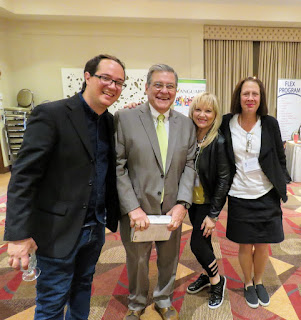McGill’s Congress on ‘Whole Person Care’
By Randy Pinsky
Busy hospital rooms, rushing medical staff...who has the time to consider patients as people? Is it not simply more efficient to approach cases as ‘the dislocated knee in room 4B’?
While a common reality, this does not necessarily need to be the case, argue the coordinators of McGill University’s Third International Congress on Whole Person Care. Guest speakers and participants from more than 12 countries will focus on the theme of “Exploring Compassion, Addiction, and Culture Change” at the McGill New Residence Hall, 3625 Avenue du Parc from October 17 to 20. While organized by the Faculty of Medicine, the team reinforces that the messages conveyed are relevant for all.

“Medicine has become so technical, so complex, that we sometimes forget that there is a whole person there,'' shared Dr. Tom Hutchinson, congress director and head of the Programs in Whole Person Care at McGill University. In striving for efficiency, the patient as an entity has faded from view. As a result, they are routinely identified as pathologies and conditions to be fixed, rather than humans with ailments.
A lack of resources combined with managerial struggles can understandably lead to harried workplaces where patient input is under-sought. But in being considered as a passive recipient of care as opposed to an active partner in the process, recovery can be compromised.
“The energy for healing comes from the patient. They need to feel validated - as a person - to get better,” reinforced Hutchinson. So it is back towards this relationship and way of thinking the congress is striving for; one “medicine can either get in the way of...or else contribute to.”
The concept of whole person care was popularized (though not coined) by Dr. Patch Adams, proponent of using humour in medicine, and focus of the film by the same name, powerfully portrayed by the legendary Robin Williams. When confronted about his unconventional approach to treating patients, Adams responded, “Is not a doctor just someone who helps someone else?”
This simple yet profound truth cuts through the efficiency and alludes to the frequently forgotten essence of medicine. The emphasis on helping and healing over curing and solving is among the take-away messages for the participants (be they fresh out of med school or with decades of experience), to return home, renewed and recommitted.
The message of viewing the patient as a whole was also evocatively expressed in the film when a woman suffering from diabetic complications was being examined by a buzz of med students. While discussing her condition as one would a chunk of marble, Adams quietly inquired from the back: “What’s her name?,” hinting at what medicine had become.
The Whole Person Care Congress seeks to directly address these issues, starting with a book launch on MD Aware: A Mindful Medical Practice Course Guide,discussing the need for humanism, self-care and compassion in medical education. This will be followed by a presentation by Dr. Gabor Maté.
McGill is already ahead of other medical schools with its compulsory Programs in Whole Person Care integrated in its curriculum. To have both such a program as well as host this conference, adds further legitimacy to the concept.
In reflecting on the motivation for coordinating congresses such as these, Hutchinson shared: “It is to remind practitioners - both new and old - that we are dealing with people, and they are who give what we do, life.”
For information or to register, visit http://bit.ly/mcgillwpc2019.











